One of Canada’s largest labour strikes has begun to seriously worry many sectors of the economy.
Western farmers are becoming increasingly concerned about their ability to ship their crops to markets, causing backups, storage issues, and cash-flow problems for them. About 90 per cent of grain is shipped by rail.
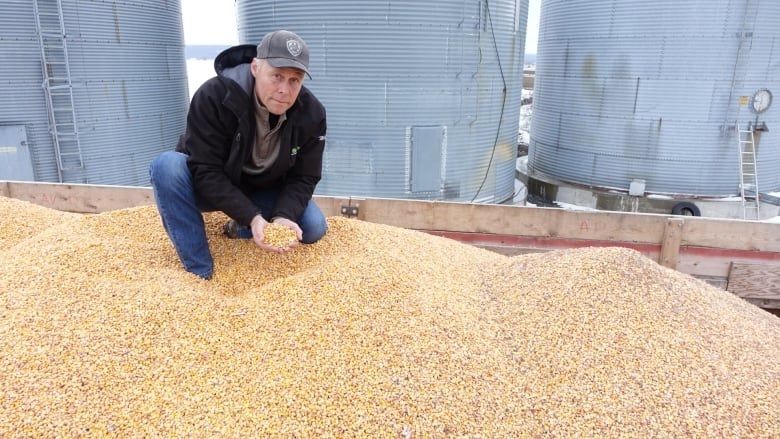
Quebec farmer Mike Verdonck is in the same position as many farmers across Canada. who need propane to dry crops and the railway to ship product to markets. He has 250 tonnes of wet corn that will go to waste if he can’t find a way to dry it soon. With nowhere to store them, like many other farmers the crops still in his field will also be lost. (Jean Deslisle/CBC)
Earlier last week some 3,200 conductors and rail workers at Canadian National Railways (CN) walked off the job over working conditions and some benefits issues. While engineers and managers remained, they can only operate about 10 per cent of normal CN traffic

Striking Canadian National Railway workers picket in front of the company’s Taschereau railyard Friday in Montreal. So far there seems to be no end to the strike on the horizon (Ryan Remiorz/The Canadian Press
Canada’s international trade is now suffering with oil producers and manufacturers also concerns about meeting international contract obligations for supply and deadlines. With exports amounting to some 30 per cent of the country’s economic output, a protracted strike could have major consequences. A fifth of total exports are carried by rail, and CN represents about half of that. Canada’s other main railway, Canadian Pacific (CPR) is unaffected by the strike.
Pressure has been mounting on the federal government to intervene, presumably with back-to-work legislation. With Parliament only set to reconvene on December 5th, the newly re-elected but minority government of Justin Trudeau has been put in a tight spot. Marc Garneau, the Minister of Transport in the meantime been making urgent calls for both sides to continue talking while stressing the negative effects rail is having on individuals, business, and the economy, but stopped short of any mention of a legislated end to the strike.
Economists estimate the strike could cost the Canadian economy over $3 billion if it lasts into early December.
Last week the Canadian Propane Association issued a statement in which officials said, “…We urge the federal government to take whatever action is necessary to ensure that rail transportation of propane is not interrupted” and, “Rail transportation is extremely important for the propane industry and for Canadians who depend on propane for their homes, businesses, farms and fleets every day”.
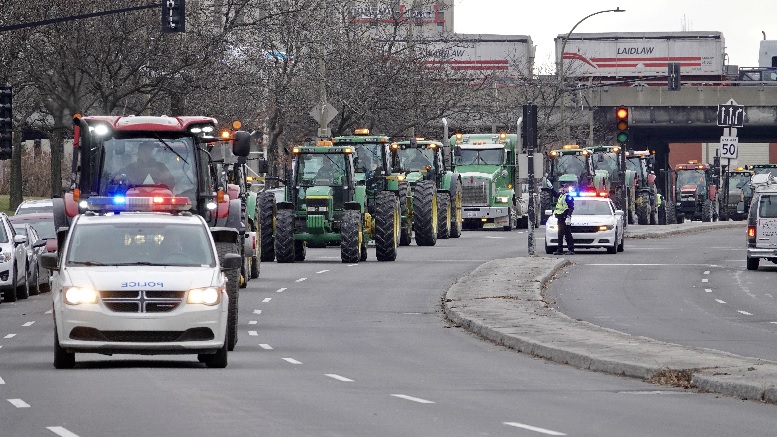
- Farmers near Montreal drove their tractors into the city today to the riding office of Prime Minister Trudeau to protest the lack of action on the strike (Simon Marc Charron-Radio-Canada)
The province of Quebec for example gets more than two-thirds of its propane by rail and has said it faces an emergency over dwindling propane supplies.
The railway’s proposal to enter into binding negotiation was rejected by the union which also issued a statement saying the railway was creating a propane crisis by choosing not to transport the gas on the trains it still runs saying, “… we believe there are enough trains going around to allow the company to supply propane to Ontario and Quebec. The question is whether CN refuses to transport propane to create a crisis and force a special back-to-work law.”
CN denies the allegation of a “fabricated” crisis saying they are doing the best they can with limiter personnel on a system with 22,000 kilometres of track, adding, ““Currently, very limited amounts of various commodities are moving across the country. This includes container traffic to keep Canada’s ports fluid to be able to return to normal operations after the strike.”
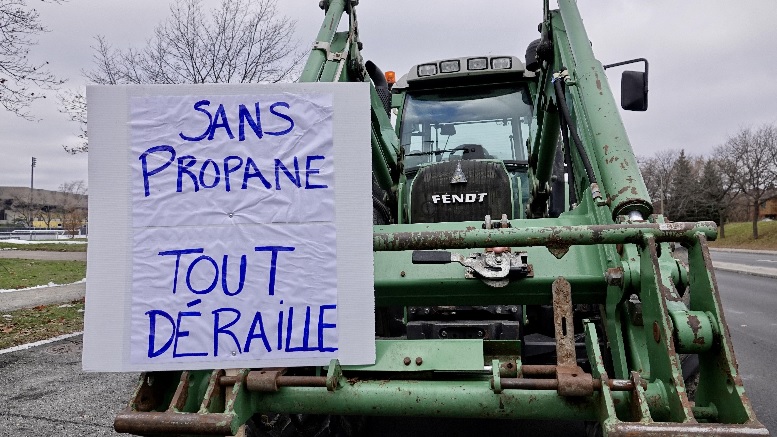
This sign on tractor in front of Prime Minister Trudeau’s Montreal riding office says “without propane- everything derails” (Simon Marc Charron-Radio-Canada)
Interprovincial squabble
As Quebec worries about a rapidly dwindling supply of propane, needed for heat in many institutions and farms across the province. Alberta’s leader has made some cutting remarks.
Along with agriculture and ranching, the western province is a major supplier of petroleum and gas. Long advocating for more pipelines, they’ve been faced with major opposition from Quebec. Faced with the serious problem of propane shortage, Alberta Premier Jason Kenney, says the solution is easy for Quebec, allow pipelines.
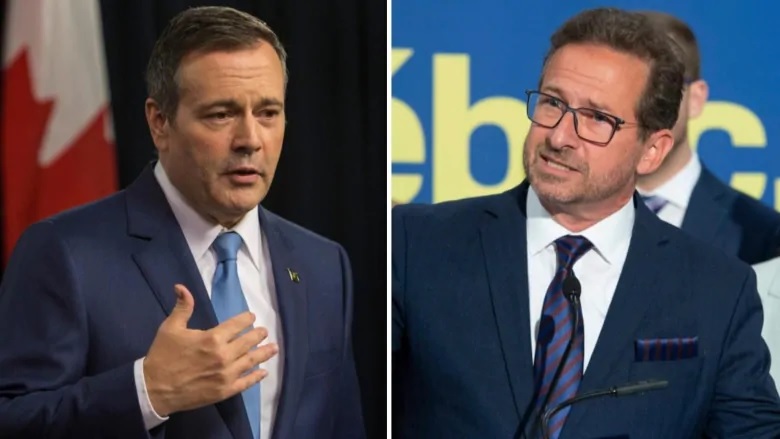
Alberta Premier Jason Kenney (L) and Bloc Québécois Leader Yves-François Blanchet (R) have been trading barbs before, but another tiff arose from the rail strike, as Kenney suggested if the Bloc is against oil, then Quebec shouldn’t accept equalisation payments from Alberta, paid for by the oil industry. Kenney later suggested to Quebec’s premier Francois Legault, that to avoid propane and fuel shortages caused by rail problems, they should relax their position against pipelines (Amber Bracken-CP / Jacques Boissinot-CP)
Earlier in the week a more pointed comment was aimed at the leader of the separatist Bloc Quebecois party, Yves-François Blanchet, who made some comments about the western separatist movement and his opposition to oil and gas. Referring to the millions of dollars of Alberta money that goes to Quebec in equalisation payments, Kenney said, “If you are so opposed to the energy that we produced in Alberta then why are you so keen on taking the money generated by the oilfield workers in this province and across western Canada?”
Additional information-sources
- Canadian Propane Association: Nov 19/19 : news release
- BNN Bloomberg: S. Hagan: Oil, wheat shipments grind to a halt
- PostMedia: M. Forrest: Nov 13/19: Kenney fires back after Bloc leader shows little sympathy for Western independence
- Canadian Press (via CJFC): Nov 24/19: Garneau says talks not bills best way to end strike
- CBC: Nov 24/19: Manitoba farmers frustrated, unable to move crops
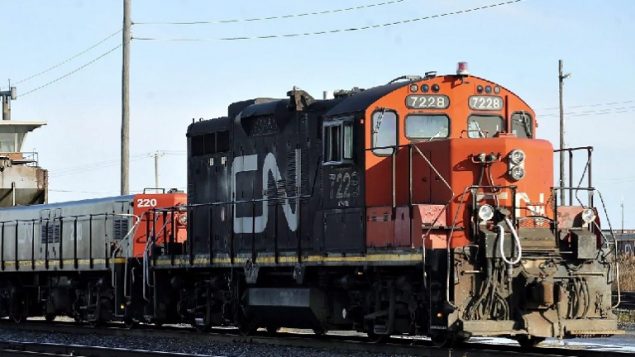






For reasons beyond our control, and for an undetermined period of time, our comment section is now closed. However, our social networks remain open to your contributions.